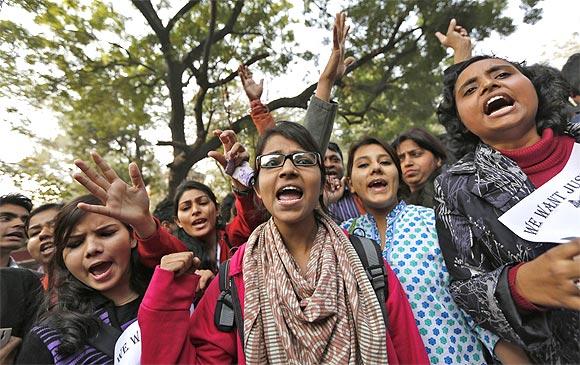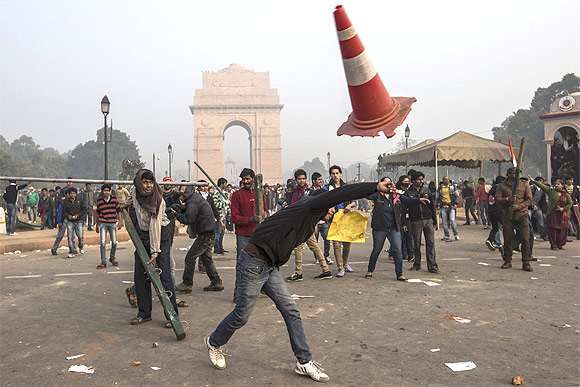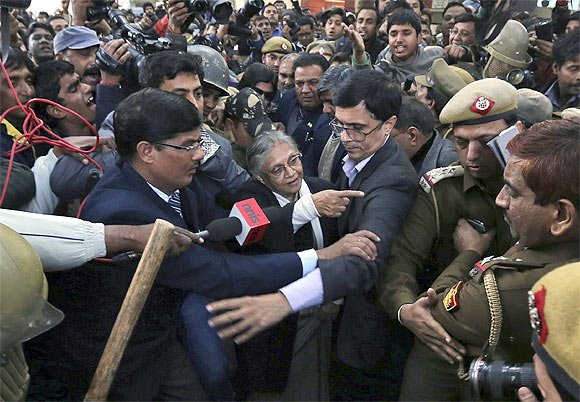Photographs: Adnan Abidi/Reuters Mihir S Sharma
40 years separate the median ages of India's Cabinet and its population.
With every passing year, India gets younger and younger and so expectations will be voiced more loudly, writes Mihir S Sharma
As India gets a year older, it gets ever younger, too. Its median age is 25, 10 years behind China's and 15 behind the United States. In some ways, this is the defining fact about this country. It helps explain its often-abysmal institutional memory; its palpable sense of expectation; its impatience and aggression; its sense of being always on the brink of some dreadful turmoil, held at bay only by hopes of the future.
In the upsurge across India's cities and towns that was sparked off by the horrific rape of a 23-year-old student a fortnight ago, young people were the prime movers. The anti-corruption protests of last year had a clear leader in Kisan Baburao Hazare and the clique of activists around him. Yet those, too, overwhelmingly attracted the young, and the nature of the audience determined Mr Hazare's and Mr Kejriwal's methods and demands.
In particular, the impatience, the self-absorption and the inconsistencies that many people detect and worry about in both protests cannot but have something to do with their average age. When you're young, you don't like anything being postponed. You don't like being told that things take time -- you have no clear conception of what "time" is. You don't remember when things were very different from how they are now, and so don't believe that change can be gradual. When you're young, you don't like being told you're part of the problem. When you're young, you know it's somebody else's fault. When you're young, if something isn't done for you, you're displeased; when it is done, you're even more displeased. All these traits, and more, were visible in the protests of the past week.
...
Anger directed at the state should directed at our antiquated society
Image: Protestors throw projectiles at Delhi police officers during a protest against the Indian governments reaction to recent rape incidentsPhotographs: Daniel Berehulak/Getty Images
It is true that there was much to protest about. India still has poor rape laws, with a medieval "two-finger test" -- Google it, it's too depressing to spell out -- and with marital rape not even an offence. Police reform has been too long delayed, causing the reporting, investigation, and conviction rate for crimes against women to be grotesquely deficient. And the government is generally inefficient, uncommunicative and arrogant.
But the idea that fixing these things requires systemic reform, which is a painful and slow process, was difficult to sell to the young people out on the streets. Nor did they trust their state to carry them out. The latter may be a reasonable fear -- though I disagree -- but the former is basic common sense.
Few, too, were initially willing to accept that the anger directed at the state should instead be directed at our own antiquated, unreformed society and culture. Try telling anyone that 90 per cent of rapes are committed by someone the girl or boy trusts -- a husband, a partner, a parent, a relative, a family friend -- and there is little or no comprehension of the fact that the state has a limited role to play in correcting a society that permits and enables this.
...
Few people in our public life have intellectual courage
Image: -Delhi's Chief Minister Sheila Dixit (C) is escorted by security personnel after she was blocked by demonstrators while entering the venue for the protests in New DelhiPhotographs: Adnan Abidi/Reuters
The relationship of the protesters to the state was revealed as a dysfunctional parent-child relationship, one devoid of useful communication on either side. The protesters wanted their state to fix the problem immediately, and complained that they weren't listening. The government didn't understand their anguish, and behaved instead like a harsh disciplinarian.
First the protesters demanded to be talked to -- but when Sheila Dikshit arrived at Jantar Mantar, she was booed away, like a child slamming their bedroom door on a parent who's finally turned up. If the circumstances weren't so tragic, the problem-family-writ-large aspect of this could have been almost funny.
Meanwhile, enough people who should know better -- older commentators, analysts, political leaders -- seem to have abdicated their responsibility to explain and guide. When you blatantly pander to people feeling their way around policy and patriarchy, rather than engaging with them intelligently, you create a cohort of people who expect pandering from then on.
If you compromise on what you know is good sense because it is more difficult to explain it to a younger, more impatient audience, it's the intellectual equivalent of dyeing your hair. Few people in our public life have intellectual courage anyway; if TV anchor-style playing to the gallery becomes the norm even for those, I shudder to think how debased our policy discourse will become.
...
Jobs deficit not fiscal deficit will bring us down
Image: An unemployed migrant worker sits on a ground in MumbaiPhotographs: Arko Datta/Reuters
So what does this mean for policy-making and politics? India has gone on happily for a while ignoring the enormous gap in age between its leaders and its people. According to The Economist, 40 years separate the median ages of India's Cabinet and its population, the largest in the world. The strain is beginning to tell.
The first point is that India must move faster on reform. On reform of everything -- of the economy, of governance, of government responsiveness. It doesn't matter if it doesn't seem immediately urgent to you, and seems a waste of your political capital; in less time than you can imagine, it will begin to matter. Most importantly, make sure that people have greater security -- and not just on the streets, though you should start there. They need to be given security and a stake in the social order the old-fashioned way, through employment.
In 2013, over 13 million young people will join the workforce. India creates, on an average, eight million jobs a year. It isn't the fiscal or current account deficit that will bring us down; it's the jobs deficit.
In the sharp contrast between the biographies of the girl who was raped and murdered recently in Delhi and those who assaulted her lies the failure of Indian policy. Every year that we delay creating a compassionate, inclusive, open and vibrant economic structure, we lose more young people.
...
Can't abdicate our responsibility to change society to leaders
Image: A fake currency note, with images of Prime Minister Manmohan Singh and Congress chief Sonia Gandhi, is worn by a protestor in New DelhiPhotographs: Parivartan Sharma/Reuters
The second point is that we can't assume that good citizenship is something people will acquire easily on their own. When young people are in a minority, they can absorb the values of citizenship from those around them. When they are in a majority, they have nobody to learn from. This creates an inherent weakness in our institutions, a worrying fragility to our discourse.
When we revamp our educational structure -- which can't be too long delayed -- the humanities and social sciences, which help create broad-minded, critical citizens, can't be ignored.
And finally, we can't abdicate our responsibility to change society to our elected leadership. We focus on the state endlessly, in an absurd mimicry of the parent-child relationship. But that sits uneasily with the dismantling of the nanny state that is at the core of the 20-year reform process.
In 2013, I will turn 35, no longer a member of the youth demographic that marketers so value. I leave it hoping that those just entering that demographic will be better caretakers of this country than I could have been at their age. But such expectations are usually doomed to disappointment. And when they will, through sheer numbers, dominate a country as much as they will India, uncertainties abound. The time to act is now.







article